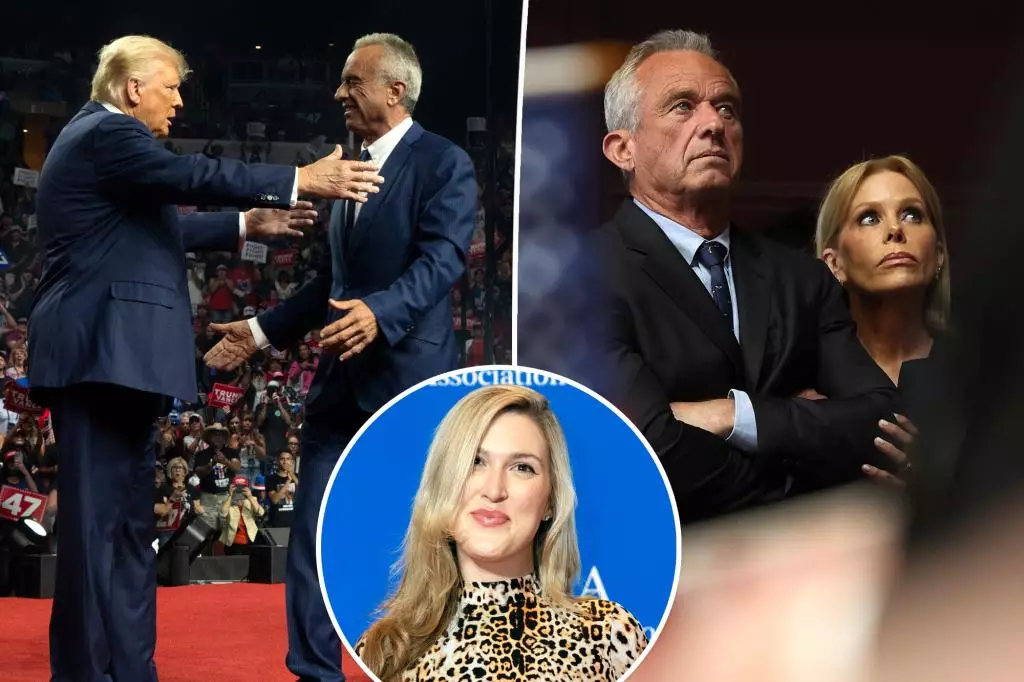The political landscape has never been devoid of intrigue, but the recent drama surrounding Robert F. Kennedy Jr. has heightened the stakes. Following claims of a clandestine digital affair with New York Magazine reporter Olivia Nuzzi, three additional women have stepped forward, alleging their own romantic encounters with Kennedy. This revelation poses a question: how will these allegations impact Kennedy’s political aspirations? Early indications suggest that, despite potential backlash, his prospects for a position in a potential Trump administration remain intact.
Kennedy is no stranger to scrutiny, and like many political figures, he is faced with the question of whether personal scandals can tarnish his public image. Given the contentious atmosphere of today’s political arena, it is worth contemplating whether the moral compass that once dictated political conduct has shifted.
In this day and age, many party insiders appear to dismiss scandalous behavior, with sources indicating that current Republican leadership is more concerned about victories than personal morality. One informed insider commented that the GOP has moved away from the old-fashioned scrutiny of personal lives, emphasizing a newer, less judgmental outlook. “The party has evolved in a good way,” they asserted, noting that the focus has shifted towards broader issues of governance rather than personal conduct.
Kennedy, who endorsed Donald Trump after stepping down from his own presidential candidacy, may find that his past indiscretions have little bearing on his future with the party. Political insiders suggest that any potential fallout from his affair with Nuzzi might even bolster his standing within the party, painting a picture of a political arena where personal scandals barely disrupt the established order.
While Kennedy’s alleged behavior hasn’t raised eyebrows among some Republican elites, there are murmurs of concern regarding its implications for national security. Unverified assertions suggest that Kennedy’s romantic entanglements could expose him to vulnerabilities, including blackmail risks. Nonetheless, sources indicate that there are ample roles in government that would exempt him from security clearances, especially in health-related positions—an area where Kennedy has significant expertise.
The contrast arises starkly: the potential risks involved in his personal life versus the demands of political roles in a Trump administration. The complexities of balancing personal history with political necessity are currently playing out in real-time as both parties strategize their future paths.
The narrative surrounding Kennedy is further complicated by his ongoing marriage to actress Cheryl Hines. Reports suggest her anger towards Kennedy’s actions, particularly his interactions with Nuzzi, and her discontent with his political alliance with Trump. The emotional toll of such a scandal can be significant—not only for the primary individuals involved, but also for their families.
Kennedy’s alleged history with women, including notes on personal “lust demons” revealed in diaries, underscores a certain recklessness. Many will ponder the ethical implications of these affairs and what they reveal about an individual’s character. For voters, the question of whether personal choices dictate political capability has never been more critical, as they sift through this complex narrative of love, betrayal, and ambition.
The Kennedy scandal extends beyond personal implications; it speaks to the larger societal shift in perceiving public figures’ personal lives. Accusations of infidelity, particularly against figures in the limelight, have often led to public outrage in the past. However, as discussed, many appear unfazed by such revelations today, reflecting a changing societal landscape and attitudes towards leadership and morality.
Simultaneously, figures like Donald Trump—who has also faced numerous allegations of infidelity—have maneuvered through similar stormy waters. The electorate’s reception to such scandals is undoubtedly influenced by the discourses surrounding gender, power, and fidelity. The dynamic interplay of public perception and personal morality remains a crucial discourse in evaluating contemporary leadership.
As the fallout continues, it remains to be seen how Kennedy navigates the current political climate. While his relationships may present potential pitfalls, his connection to Trump and the shifting values within the Republican Party could ultimately serve as a buffer rather than a hindrance. For Kennedy, the future could hinge significantly on his ability to adapt to public expectations and continue leveraging his lineage while distancing himself from the increasingly problematic associations of his past.
In the end, the unfolding drama not only serves as a cautionary tale for public figures but also highlights the intricacies of political strategy in an era where the stakes are high and the margins, razor-thin. Whether this story concludes with redemption or further scandal will depend largely on the reactions of the electorate and the media, leaving a critical lens focused on both Kennedy and the evolving nature of political scrutiny in America.

